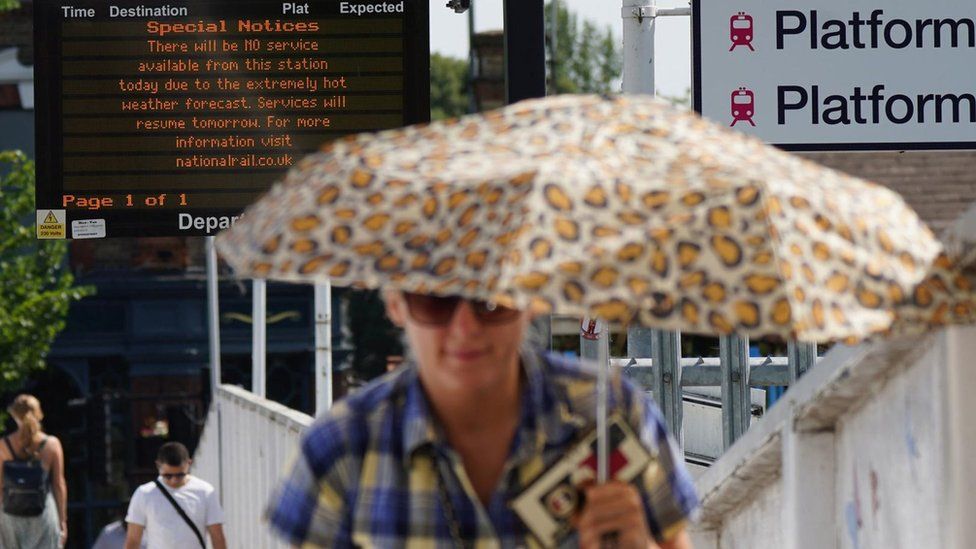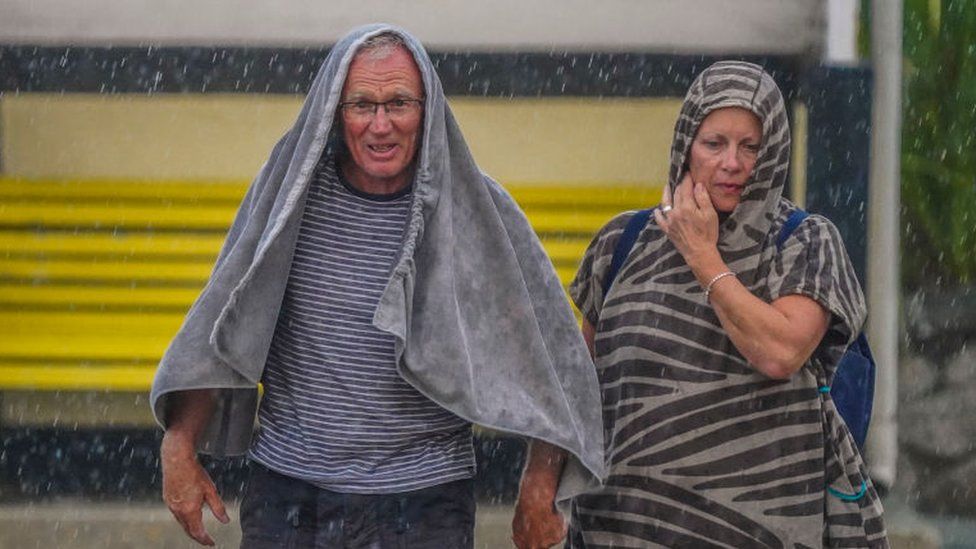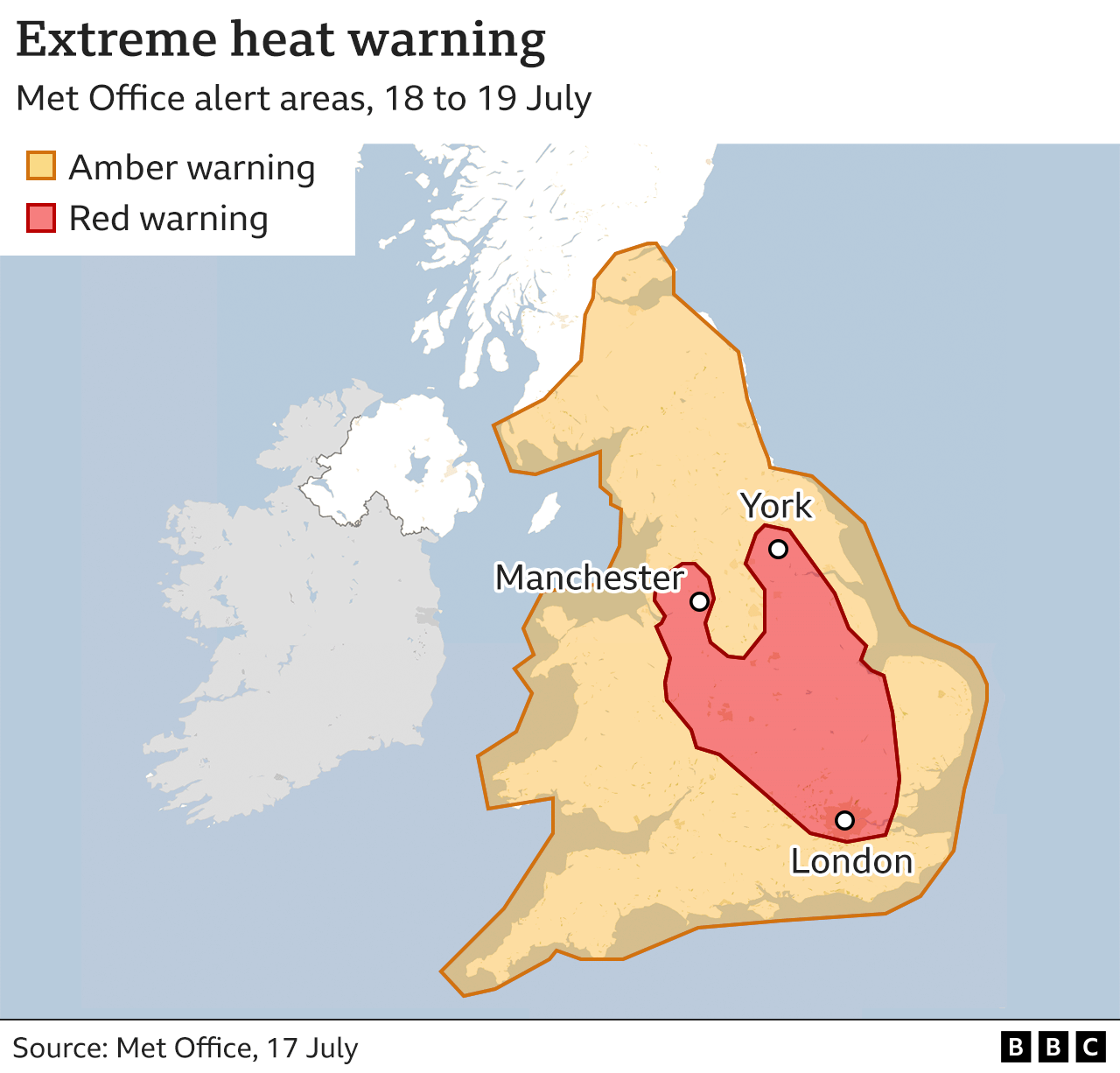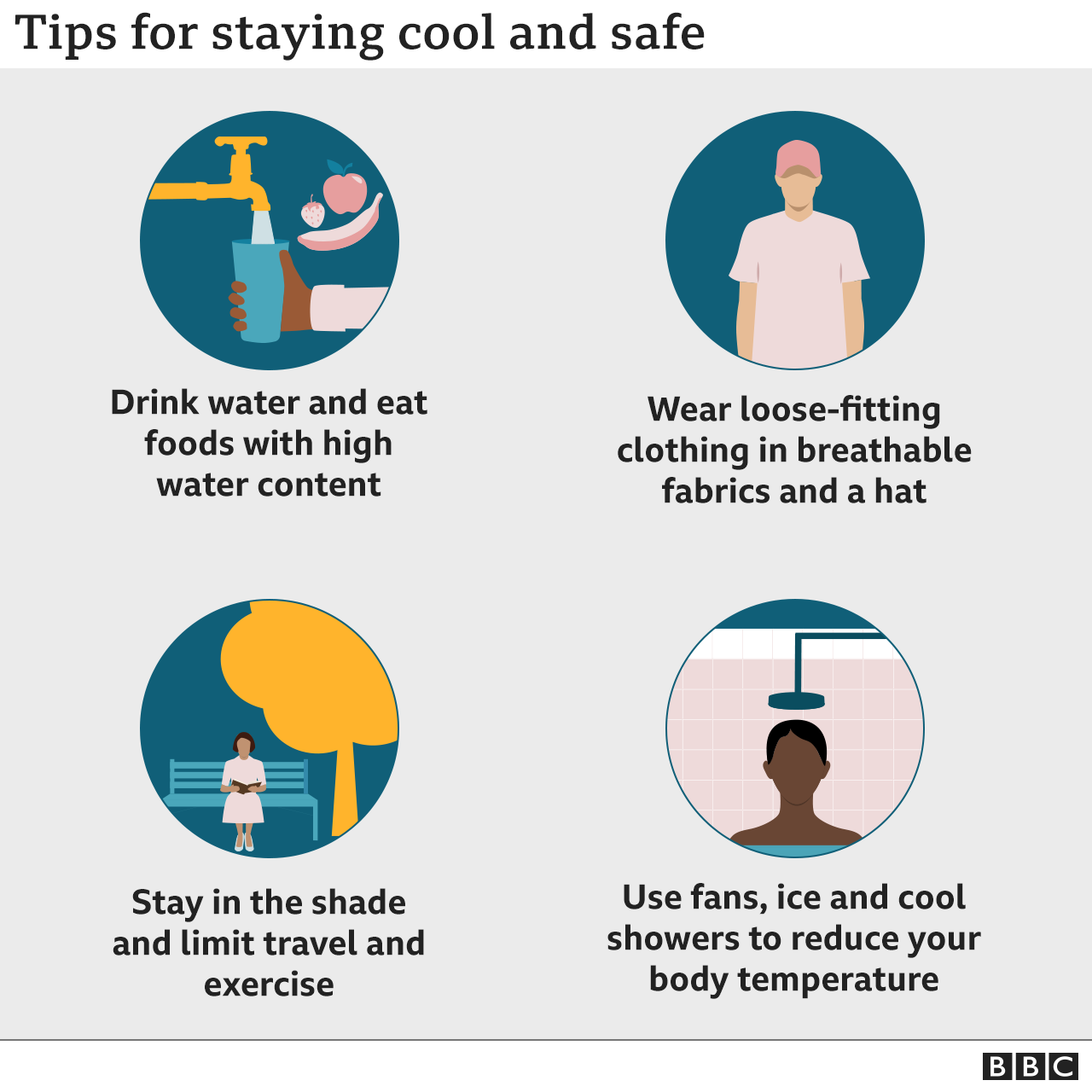Roads melting, power cuts and a surge in emergency calls are reported as the UK swelters in the building heat.
This video can not be played
To play this video you need to enable JavaScript in your browser.
The UK has recorded a temperature of over 40C (104F) for the first time – as the heat continues to rise.
Thermometers hit 40.2C at London Heathrow at 12.50 BST, breaking a record temperature registered just two hours earlier.
Roads melting and power cuts have been reported as the UK swelters in the building heat.
At least five people have died in and around water over the past two days amid warnings about the dangers.
Emergency services are experiencing a rise in 999 calls as they face the pressure of the extreme heat, with the World Meteorological Organisation warning that the UK and other affected countries should expect more deaths among the elderly and vulnerable.
Tuesday’s temperatures are expected to climb higher still, with places along the A1/M1 corridor expected to see up to 42C later.
By noon, Scotland reached 30C in Eskdalemuir in Dumfries and Galloway, while in Wales, Hawarden in Flintshire registered 36C, provisionally the second highest temperature on record in Wales.
The Met Office has issued a red extreme heat warning covering much of central, northern, and south-east England.
Network Rail has warned against travel, road surfaces have warped, and in Yorkshire a number of power cuts have been reported.
BBC Weather’s Simon King said: “For meteorologists, exceeding records by a margin of two or three degrees is a staggering thought, when historically records were only broken by fractions of a degree.”
In other developments:
- Emergency services are searching for a person believed to be missing off Clacton Pier in Essex
- A man died after being pulled from the sea on the Isle of Wight
- Sagging conductors and overheating transformers caused faults with the power network in Yorkshire
- Network Rail issued a “do-not-travel” warning for Tuesday, affecting services travelling through the “red zone”
- Thameslink, Great Northern, East Midlands and East Coast services are heavily disrupted – or cancelled altogether
- The Supreme Court moved hearings online, while the British Museum confirmed it would shut early at 15:00
The extreme warning, indicating a threat to life, is in place in an area stretching between London, Manchester and York.
There was a markedly cooler outlook for Penzance, Cornwall, where thundery storms hit the popular holiday destination and were projected to last until midday.
But by 16:00, Lincoln, Cambridge and Huntingdon could also see 40C – and areas in the A1/M1 corridor may be hotter than this.
Meanwhile, provisional figures showed the UK experienced the warmest night on record from Monday into Tuesday.
Emley Moor in West Yorkshire is likely to have broken that record, where 25.9C was recorded overnight, according to the Met Office.

Image source, PA Media

Image source, Getty Images

Image source, PA Media
Rail services on Monday evening were heavily impacted by the extreme heat, Network Rail said, with buckled rails reported and overhead wire systems failing. A new record rail temperature of 62C was recorded in Suffolk.
Jake Kelly, the group director for system operation at Network Rail, said it had taken “the difficult and regrettable” decision to close the East Coast Mainline and the Midland Mainline due to record temperatures.
Mr Kelly told BBC Radio 4’s Today programme: “We don’t take decisions like this lightly. Our engineers work very hard assessing the capability of the infrastructure facing that record heat, and we decided that we had no choice but to close it.”
Transport Secretary Grant Shapps said the UK’s rail network could not cope with the extreme heat, adding that it would take “many years” before upgrades would mean services could handle the hotter climate.
“The simple answer is no, the network cannot cope with the heat right now,” he told BBC Breakfast. “In 40C heat, tracks can reach 50C, 60C, and even 70C, and there’s a severe danger of tracks buckling and a terrible derailing.
“We are building new specifications, creating overhead lines that can withstand higher temperatures. But with the best will in the world, this is infrastructure which has taken decades to build, with some of our railways stretching back 200 years.”
Runways at Luton Airport and RAF Brize Norton were impacted by the heat on Monday – forcing aircraft to divert.
This video can not be played
To play this video you need to enable JavaScript in your browser.
There have also been warnings of pressure on hospitals and ambulance services as temperatures are set to peak on Tuesday afternoon.
Health Secretary Steve Barclay said more call handlers had been put in place and additional funding had been made available for ambulance and 111 services.
London Ambulance Service said it fielded 6,600 calls on Monday related to the heatwave, experiencing a peak of 300 calls at 23:00.
Brian Jordan, director of 999 operations at London Ambulance Service, said he was “very pleased” that the number of callers fell short of the 8,000 expected.
“Yesterday was still a busy and long day, and I cannot emphasise enough that people need to follow the same advice as Monday and avoid exposure to the sun,” he told the Today programme.
“Early indications show a slight increase in fainting due to heat exposure. We could see this rise in even higher temperatures today.”
He added that the service had “been working really closely” with hospitals to ensure waits are not longer than normal.
Monday saw a number of schools close despite government advice against doing so, although one teaching union said the majority of schools had remained open.
Water companies in southern and eastern England have warned increased demand is leading to low pressure – and even interrupted supply – for some households.

How have you been coping? Please email haveyoursay@bbc.co.uk or:
- WhatsApp: +44 7756 165803
- Tweet: @BBC_HaveYourSay
- Upload your pictures/video here
- Please read our terms & conditions and privacy policy

Heatwaves are becoming more likely and more extreme because of human-induced climate change.
The world has already warmed by about 1.1C since the industrial era began, and temperatures will keep rising unless governments around the world make steep cuts to emissions.
We are living in the hottest period for 125,000 years, according to the UN’s climate science body, the Intergovernmental Panel on Climate Change.

Farmers have warned the UK is not equipped to deal with water shortages caused by the changing climate.
Minette Batters, the president of the National Farmers’ Union, said the unprecedented temperatures were “really highlighting issues with water security”.
“It’s not a full-blown drought yet, but we really need to be focusing on what needs to be done before it gets worse,” she said.
Following several deaths, people are being urged not to cool off in open water. “Whilst it may seem tempting on a hot day, please don’t get in the water,” the Canal & River Trust said.
Much of Europe and North Africa is also experiencing extreme heat with wildfires breaking out in France, Spain, Portugal, Greece and Morocco.
Temperatures look likely to drop across the UK on Wednesday, with heavy showers and thunderstorms causing potential disruption from 13:00 to 23:00 across the south east of England.


- NUTRITIONAL INTELLIGENCE: Do we subconsciously eat what our body needs?
- ‘MUM RAGE’ EXPLAINED: Could meltdowns signal a need for self-care?
